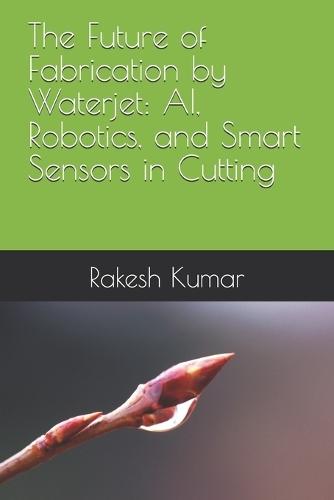Overview
Waterjet cutting has emerged as one of the most versatile and precise fabrication technologies of the modern era. From intricate metal components in aerospace to delicate composites in medical devices, waterjet systems have proven their ability to cut almost any material with exceptional accuracy, minimal thermal impact, and superior edge quality. However, as industries evolve, traditional waterjet processes alone can no longer meet the increasing demands for speed, efficiency, customization, and sustainability. This book explores the convergence of cutting-edge technologies-Artificial Intelligence (AI), robotics, smart sensors, Industrial IoT, cloud computing, and digital twins-that are redefining waterjet cutting into a smart, adaptive, and future-ready fabrication process. By integrating these technologies, manufacturers can optimize cutting parameters in real-time, reduce material waste, enhance precision, and enable predictive maintenance, all while adapting dynamically to complex production requirements. The chapters begin with the fundamentals of waterjet cutting, detailing working principles, suitable materials, and inherent advantages and limitations. From there, the narrative progresses through the historical evolution of waterjet technology, highlighting milestones that paved the way for automation and digital integration. Subsequent sections delve deeply into AI applications, including adaptive cutting, predictive maintenance, and real-world case studies demonstrating enhanced efficiency and cost savings. Robotic integration is explored next, showcasing 6-axis robotic arms, CAD/CAM interfacing, and aerospace and automotive use cases, followed by smart sensors and real-time feedback systems that elevate safety, accuracy, and operational intelligence. The book also examines Industrial IoT, cloud computing, edge intelligence, and digital twins, which collectively enable predictive analytics, virtual prototyping, and synchronized multi-plant operations. Augmented and virtual reality (AR/VR) applications demonstrate the future of operator training, remote assistance, and immersive manufacturing environments. Later chapters focus on customization, on-demand fabrication, and sustainability, emphasizing intelligent CAM systems, adaptive cutting for mixed materials, water and abrasive recycling, energy-efficient cutting paths, and green manufacturing compliance. The final sections provide insights into economic benefits, ROI, and building smart waterjet facilities, equipping readers with practical guidance to implement these technologies effectively. Through case studies, real-world examples, and Python-based code simulations, this book bridges the gap between theory and practical implementation, offering engineers, managers, researchers, and students a comprehensive roadmap to smart, AI-driven waterjet fabrication. The future of fabrication is no longer just about cutting materials; it is about integrating intelligence, automation, and sustainability into every cut. This book is dedicated to inspiring the next generation of innovators to harness these technologies and shape the factories of tomorrow.
Full Product Details
Author: Rakesh Kumar
Publisher: Independently Published
Imprint: Independently Published
Dimensions:
Width: 15.20cm
, Height: 1.50cm
, Length: 22.90cm
Weight: 0.381kg
ISBN: 9798262500871
Pages: 282
Publication Date: 27 August 2025
Audience:
General/trade
,
General
Format: Paperback
Publisher's Status: Active
Availability: Available To Order

We have confirmation that this item is in stock with the supplier. It will be ordered in for you and dispatched immediately.



